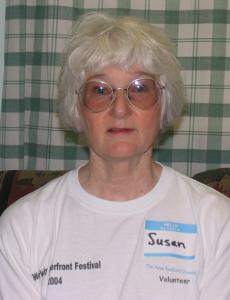Susan Peterson

The Working Waterfront Festival Community Documentation Project
This project documents the history and culture of the commercial fishing industry and other port trades. The project began in 2004 in conjunction with the Working Waterfront Festival, an annual, educational celebration of commercial fishing culture which takes place in New Bedford, MA. Interviewees have included a wide range of individuals connected to the commercial fishing industry and/or other aspects of the port through work or familial ties. While the majority of interviewees are from the port of New Bedford, the project has also documented numerous individuals from other ports around the country. Folklorist and Festival Director Laura Orleans and Community Scholar and Associate Director Kirsten Bendiksen are project leaders. The original recordings reside at the National Council for the Traditional Arts in Maryland with listening copies housed at the Festival's New Bedford office.
Azure Dee Westwood
Susan Petersen is an anthropologist who has dedicated a significant portion of her career to studying the fishing industry in Massachusetts. She moved to the state in 1973, shortly after earning her PhD from the University of Hawaii. Petersen began her research at the Woods Hole Oceanographic, where she sought to understand the structure of the fishing industry, including boat ownership, financial structures, and the impact of fish stocks on the industry's health. In addition to her research, Petersen was politically active in advocating for the 200-mile limit, also known as the Magnuson Act. She served on the Scientific and Advisory Committee for the New England Fisheries Management Council and the mid-Atlantic Council. Petersen also worked for the State Department as an expert in the Canadian-U.S. boundary dispute in the early 1980s. Beyond her work in the fishing industry, Petersen is a co-founder of the Coalition for Buzzards Bay, an organization dedicated to preserving and improving the health of Buzzards Bay.
Scope and Content Note
This interview with Susan Petersen, conducted by Janice Fleuriel on September 24, 2006, provides a detailed account of Petersen's research and involvement in the Massachusetts fishing industry. Petersen discusses her initial introduction to the industry, including her early morning visits to the fish auction in New Bedford and her interactions with the fishing community. She provides insight into the ethnic makeup of the industry during the 1970s, noting the dominance of Norwegians and the presence of eastern Europeans and Nova Scotians. Petersen also discusses her research on the financial structure of the fishing fleet and her political activism in support of the 200-mile limit. She recounts her work with the Scientific and Advisory Committee for the New England Fisheries Management Council and the mid-Atlantic Council, as well as her role in the Canadian-U.S. boundary dispute. The interview also touches on Petersen's involvement in the Coalition for Buzzards Bay and her observations on the evolving fishing community, the impact of overfishing, and the health of Buzzards Bay.
Please Note: The oral histories in this collection are protected by copyright and have been created for educational, research and personal use as described by the Fair Use Doctrine in the U.S. Copyright law. Please reach out Voices@noaa.gov to let us know how these interviews are being used in your research, project, exhibit, etc. The Voices staff can help provide other useful resources related to your inquiry.
The NOAA mission is to understand and predict changes in climate, weather, oceans, and coasts, to share that knowledge and information with others, and to conserve and manage coastal and marine ecosystems and resources. The Voices Oral History Archives offers public access to a wide range of accounts, including historical materials that are products of their particular times, and may contain offensive language or negative stereotypes.
Voices Oral History Archives does not verify the accuracy of materials submitted to us. The opinions expressed in the interviews are those of the interviewee only. The interviews here have been made available to the public only after the interviewer has confirmed that they have obtained consent.
